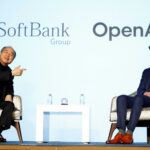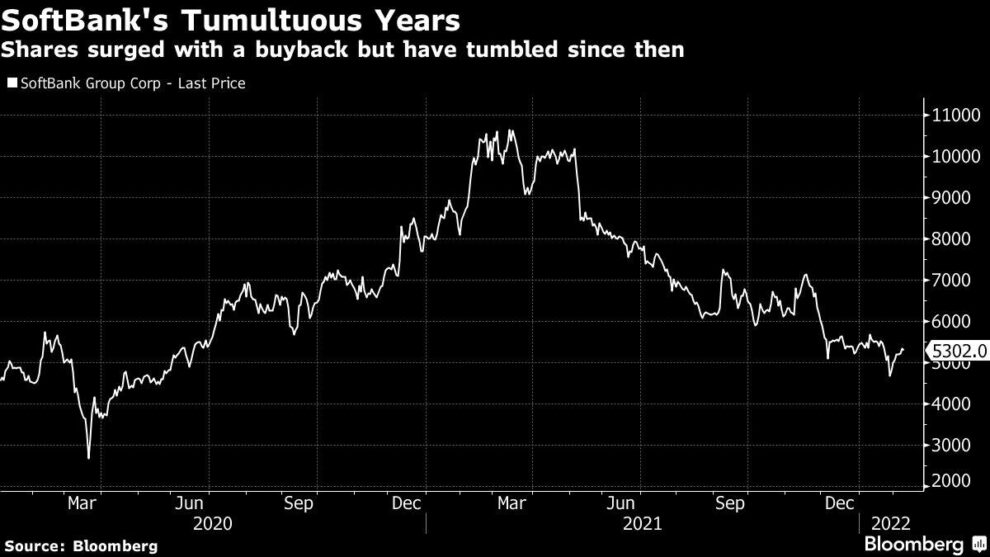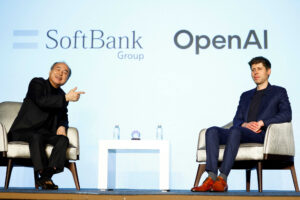
(Bloomberg) — SoftBank Group Corp. founder Masayoshi Son said he plans an initial public offering in the U.S. for Arm Ltd. after Nvidia Corp. bowed to regulatory opposition and gave up on its proposed acquisition of the British chip designer.
Most Read from Bloomberg
While the Japanese billionaire announced the deal’s termination as his conglomerate announced earnings for the quarter ended in December, he spent much of the 90-plus minute conference call with investors and analysts pitching the potential for Arm.
He began the presentation in Tokyo by reciting the company’s accomplishments and explaining how use of the company’s technology has gone beyond smartphones to automobiles and cloud computing. Arm is about to embark on its “golden age” where it’ll have its second growth spurt, he said. While an IPO now is SoftBank’s fallback, the company had considered a similar debut before Nvidia proposed its acquisition.
“This is a return to our original plan,” Son said. “We will aim for the biggest IPO ever in semiconductor history.”
Money is an issue. The Nvidia deal was valued at about $40 billion when announced in 2020, but that valuation surged by tens of billions of dollars with the bidder’s stock price. SoftBank is likely to struggle in landing a similar valuation in an IPO.
The Japanese company is aiming for an IPO in the fiscal year ending in March 2023. Arm President Rene Haas is taking over the chief executive officer role from Simon Segars, who resigned.
Son has been buffeted by a downturn in the technology market. The Japanese billionaire has invested aggressively in startups, only to see the value of public holdings such as Didi Global Inc. and DoorDash Inc. tumble. SoftBank’s own shares have dropped 50% from their peak in March of last year.
Son admitted that a “blizzard” he described in November had not yet cleared up.
“The storm has not ended,” he said in the press conference. “In fact, the storm got stronger in the U.S. and other countries.”
Arm Failure May be the Least of SoftBank’s Worries: Tim Culpan
The net value of SoftBank’s assets — Son’s preferred measure of judging SoftBank’s performance — fell to $168 billion at the end of December, down from $187 billion three months earlier. That helped push its closely watched loan-to-value ratio to 22%, the highest it’s been since about 2018.
SoftBank’s Vision Fund did return to profitability for the quarter ended in December, earning 109 billion yen ($940 million) in the three months ended Dec. 31. That follows a record 825.1 billion yen loss in the fiscal second quarter.
Son’s preoccupation with Arm was such that he brushed away questions about major issues of concern to investors. When asked about the departure of Chief Operating Officer Marcelo Claure and the need for a succession plan, Son simply praised his former lieutenant and said he was feeling healthy enough to keep running the company. He pointed out that he broke 200 on a recent trip to the bowling lanes.
He also briefly addressed SoftBank’s high exposure to Chinese companies, starting with Alibaba Group Holding Ltd. — the e-commerce leader at the heart of Beijing’s crackdown on the internet sector’s biggest players. He emphasized the proportion of these firms has been reduced significantly in recent quarters.
Read more: Wall Street’s Big Bet on Chinese Markets Is Going All Wrong
Nvidia proposed the acquisition of Arm in September 2020, aiming to take control of chip technology that’s used in everything from phones to factory equipment. But the transaction faced opposition from the start. Arm’s own customers scorned the idea, and regulators vowed to give it close scrutiny.
The purchase was dealt its most severe blow when the U.S. Federal Trade Commission sued to block it in December, arguing that Nvidia would gain too much control over chip designs used by the world’s biggest technology companies. The agreement also needed approval in the European Union and China, as well as the U.K., where Arm is based — none of which appeared poised to clear the transaction.
Arm’s value has always been its neutrality, something that SoftBank, which doesn’t compete with any of the technology’s customers, was able to maintain. When Nvidia announced the deal, concerns grew that either its value would be destroyed by the change in ownership or opposition would scuttle its chances of getting signoff from governments around the world.
With the deal’s termination, SoftBank will keep a $1.25 billion breakup fee.
Son returned to Arm’s potential after running through the financial results for the rest of the company. He introduced Haas, the company’s incoming CEO, who spoke by video on the call. Haas chimed in that Arm’s technology is becoming more widely adopted.
“We are now becoming the de facto standard in cars,” he said. “Some have 10 to 20 chips, some even have as many as 30 to 40 chips.”
In the financial results, SoftBank showed that Arm’s revenue had climbed 47% in the first nine months of the fiscal year.
“Arm has powered the smartphone revolution around the world. Going forward, we believe that Arm products are going to power auto, cloud, metaverse, IOT — a variety of areas. And that’s how it’s been evolving,” Son said. “Arm is embarking on a second growth stage.”
Most Read from Bloomberg Businessweek
©2022 Bloomberg L.P.






